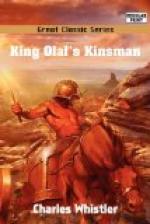The account of the battle of Ashingdon follows the definite local traditions of the place. The line of the river banks have changed but little, and Cnut’s earthworks still remain at Canewdon. The first battlefield is yet known, and they still tell how Eadmund was forced to fight on Ashingdon hill because his way across the ford was barred by the Danish ships, and how the pursuit of the routed English ended at Hockley.
Wulfnoth and his famous son Godwine are of course historic. The Anglo-Saxon Chronicle tells us how the earl was driven into sullen enmity with Ethelred by Streone’s brother, and the Danish Sagas record Godwine’s first introduction by Jarl Ulf to Cnut after the battle of Sherston.
As for the places mentioned in Redwald’s story, the well on Caldbec hill still has its terrors for the village folk, and the destruction of the ancient mining village at Penhurst by the Danes is remembered yet with strange tales of treasure found among its stone buildings. The Bures folk still speak of the White Lady of the Mere, and their belief that Boadicea lies under the great mound is by no means unlikely to be a tradition of her true resting place.
C. W. WHISTLER
Stockland, Nov. 1896.
Chapter 1: The Coming Of The Vikings.
All along our East Anglian shores men had watched for long, and now word had come from Ulfkytel, our earl, that the great fleet of Swein, the Danish king, had been sighted off the Dunwich cliffs, and once again the fear of the Danes was on our land.
And so it came to pass that I, Redwald, son of Siric, the Thane of Bures, stood at the gate of our courtyard and watched my father and our sturdy housecarles and freemen ride away down the hill and across the winding Stour river to join the great levy at Colchester. And when I had seen the last flash of arms sparkle from among the copses beyond the bridge, I had looked on Siric, my father, for the last time in this world, but no thought rose up in my mind that this might be so.
Yet if I stand now where I stood on that day, and see by chance the glimmer of bright arms through green boughs across the river, there comes to me a rush of sadness that dulls the bright May sunshine and the sparkle of the rippling water, and fills the soft May-time wind with sounds of mourning. Now to me it seems that I was thus sad at the time that is brought back to me. But I was not so. It is only the weight of long years of remembrance of what should have been had I known. At that parting I turned back into the hall downcast, only because my father had thought me not yet strong enough to ride beside him, and a little angry and hurt moreover, for I was broad and strong for my sixteen years.
Little thought I that in years to come I should remember all of that leave taking, even to the least thing that happened; but so it is. No man may rightly be said to forget aught. All that he has known and learnt is there, hidden up in his mind to come forth if there is anything that shall call it again to light.




